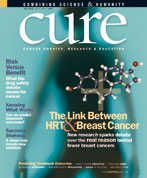Publication
Article
CURE
Diagnosis Delay
Author(s):
Delayed diagnosis too common.
Experts stress the importance of catching cancer early at its most treatable stage. But in the childhood population, cancer is usually so rare that it’s often overlooked when a child initially has symptoms. The delay in diagnosis can be costly since most childhood cancers are considered fast-growing.
Researchers examined 23 studies conducted between 1976 and 2006 to find any underlying patterns that may contribute to delayed diagnosis, which included the time it took parents to take the child to a physician after symptoms appeared, and from the first health care visit to cancer diagnosis.
Findings of the study, published in August in the journal Cancer, found physician delays to be longer than parent delays in the majority of studies. Factors influencing time to diagnosis included the child’s age, parents’ education level, symptoms, cancer stage, the initial medical specialty consulted, and most significantly, the type of cancer. How those factors relate to prognosis and outcome remains unknown.
The analysis, concluded the authors, is the first step in developing new strategies and programs to shor ten the delay in diagnosis for childhood cancer patients.





